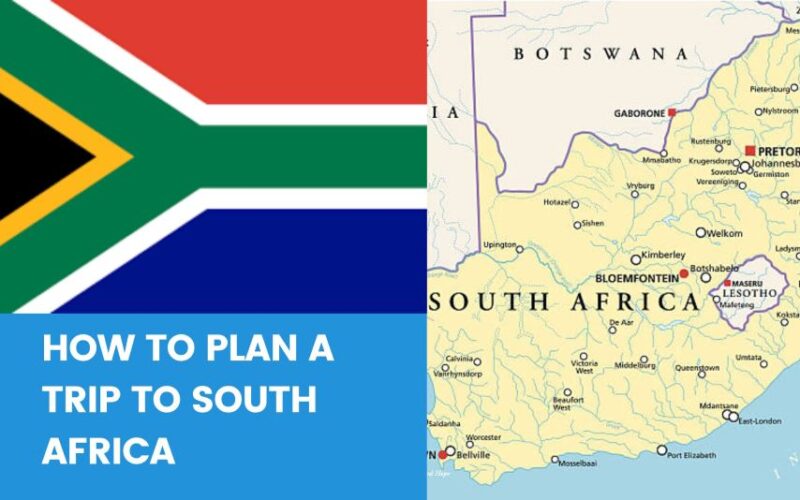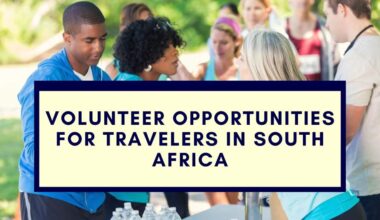In this article on Daily Migrant Travels, we shall discuss the 6 essential tips on how to plan a trip to South Africa successfully.
South Africa is a land of breathtaking natural beauty, diverse cultures, animals, resources, and endless adventure.
We can speak of the stunning beaches of Cape Town or the majestic landscapes of Kruger National Park, to mention but a few.
Obviously, this vibrant country offers something for every traveler!
However, planning a successful trip to South Africa requires careful consideration, research, and preparation.
Since South Africa is so large and offers so many possibilities, organizing a trip there can be rather difficult, especially for families.
Again, choosing the wrong timing or an unsuitable safari experience could ruin your meticulously planned journey.
So, having explored South Africa as a team at Daily Migrant Travels, we shall guide you from choosing your destination and travel dates to packing appropriately and understanding local laws and customs as well.
Also, we’ll cover all the key aspects of planning a successful trip to South Africa and provide helpful guidance on things like making travel and hotel reservations, organizing your schedule, and minimizing costs during travel.
So, whether you’re a seasoned traveler or planning your first trip to this beautiful country, read on to discover the essential tips for planning a trip to South Africa that you’ll never forget!
How to plan a trip to South Africa: Choose Your Destination and Travel Dates

In discussing how to plan a trip to South Africa, choosing your destination and travel dates is a very important step.
As you might have known, South Africa is a beautiful country that offers a wide range of destinations and travel experiences.
So, to make the most of your trip, it’s essential to decide on the specific places you want to visit and the ideal time of the year to travel.
Some Popular Destinations to Explore in South Africa
Our team at Daily Migrant Travels has traveled widely in South Africa, and here, we shall bring you some of the most popular places to explore in South Africa.
- Cape Town
Cape Town is the legislative capital of South Africa.
It is the country’s oldest city and the seat of the Parliament of South Africa.
Cape Town is known for its natural and magnificent beaches, iconic Table Mountain, and lively culture.
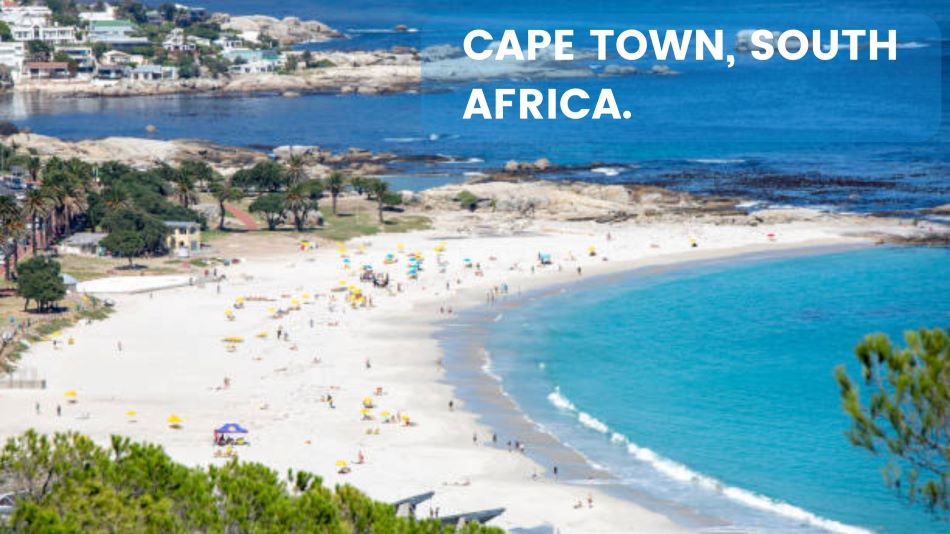
- Johannesburg
Johannesburg is the most populous city in South Africa, with 4,803,262 people at the time of writing this article.
Also, it is classified as a megacity.
According to Wikipedia, Johannesburg is one of the 100 largest urban areas in the world offering a mix of history, art, and commerce.
- Kruger National Park
Kruger National Park is a South African National Park and one of the largest game reserves in Africa.
It covers an area of 19,623 km2 (7,576 sq mi) in the provinces of Limpopo and Mpumalanga in northeastern South Africa and extends 360 km (220 mi) from north to south and 65 km (40 mi) from east to west.
Kruger National Park is South Africa’s most exciting African safari destination offering an unforgettable wildlife experience.
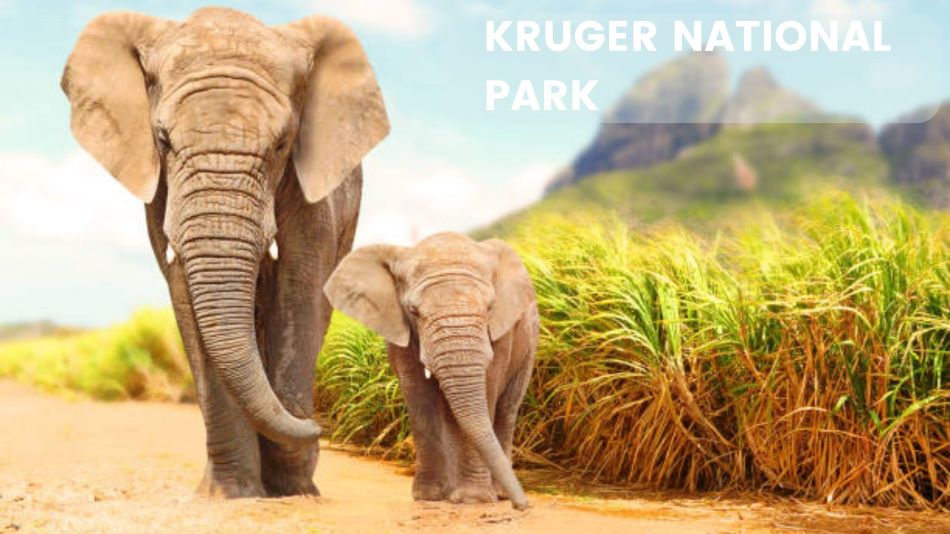
- Durban
According to Wikipedia, Durban is the third-most populous city in South Africa after Johannesburg and Cape Town and the largest city in KwaZulu-Natal.
Durban forms part of the eThekwini Metropolitan Municipality, which includes neighboring towns and has a population of about 4 million, making the combined municipality one of the largest cities on the Indian Ocean coast of the African continent.
It’s worthy of note that Durban was also one of the host cities of the 2010 FIFA World Cup.
It’s a coastal city known for its beaches, cuisine, and cultural diversity.
- Winelands
The Cape Winelands District Municipality formerly the Boland District Municipality, is a district municipality located in the Boland region of the Western Cape province of South Africa.
The Cape Winelands is home to some of the world’s best wineries, offering magnificent scenery and delicious wines.
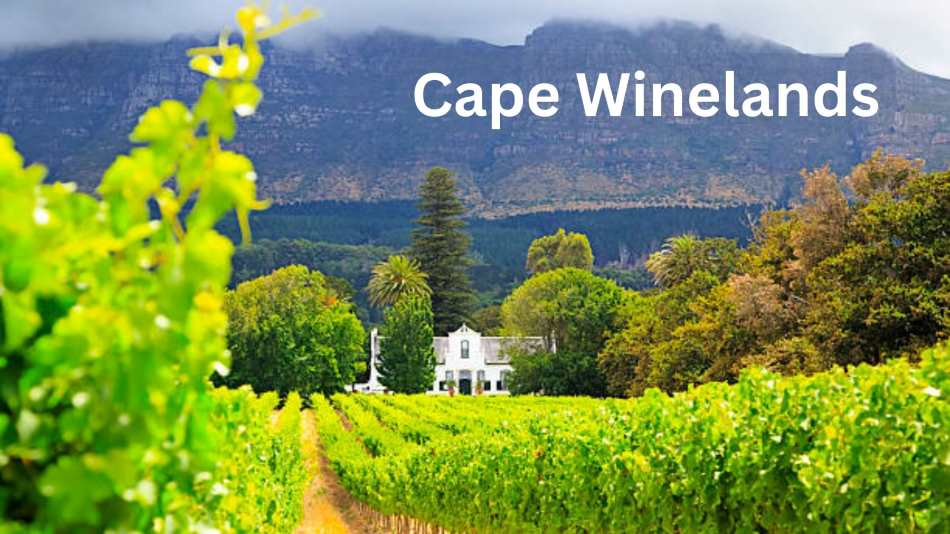
Considerations for Choosing Your Travel Dates to South Africa
In planning a trip to South Africa, there are some considerations you need to make in choosing your travel dates.
Some of them include:
- The Weather
South Africa has a mild climate, but the weather can vary by region.
So, I will advise you to research the best time of the year to visit your chosen destinations based on your travel intentions.
- Events and Festivals
From my experience and that of others, you might want to consider timing your trip around popular events like the Cape Town International Jazz Festival or the Klein Karoo National Arts Festival.
This is because it can enrich your trip by offering chances for unforgettable moments, encounters with different cultures or cultural performances, and improved entertainment.
- Crowds and Prices
In considering your travel dates, note that peak tourist seasons can mean higher prices and crowds.
So, you might want to consider traveling during shoulder seasons for a more relaxed experience.
How to plan a trip to South Africa: Planning Your Itinerary properly

Planning your itinerary is a crucial step in ensuring a successful trip to South Africa.
What is a travel itinerary?
In case you didn’t know, a travel itinerary is a thorough timetable that contains vital details about your trip, like your lodging or accommodation, activities, and modes of transportation.
It acts as a roadmap to assist you in planning your travels and making the most of your time when visiting a new place.
Here are some tips to help you create a flexible and enjoyable itinerary:
- Research Attractions:
Before you arrive, research popular tourist attractions and off-the-beaten-path destinations.
This means that you need to consider the must-see attractions like Table Mountain, Kruger National Park, and the Cape Winelands.
Also, it is advisable to look for unique experiences, like a township tour in Cape Town or a visit to the Apartheid Museum in Johannesburg.
- Prioritize Your Activities:
So, based on your research, you can prioritize the activities and attractions that are most important to you.
In doing that, consider factors like location, cost, and personal interests.
- Create a flexible itinerary:
Once you have a list of priority activities, then create a flexible itinerary that allows for spontaneity and exploration.
Also, leave some free time in your schedule to discover hidden gems and soak up the local culture as much as you can or want.
- Consider Day Trips and Excursions:
Don’t limit yourself to the cities; consider taking day trips and excursions to nearby attractions like the Garden Route, the Drakensberg Mountains, or the Stellenbosch wine region.
- Plan for Downtime:
Finally, plan for some downtime even though it may be tempting to jam as many activities as possible into your schedule.
You should plan some leisurely days to explore your neighborhood or just unwind at your lodging to refresh and think back on your activities.
So, take the time to research, prioritize, and plan your itinerary to ensure a successful and enjoyable adventure!
Some popular activities and excursions to consider including in your itinerary are:
- A safari in Kruger National Park or a private game reserve.
- A wine tour in the Cape Winelands, Stellenbosch, or Franschhoek.
- A visit to the historic town of Stellenbosch, known for its charming architecture and vibrant student culture.
- A trip to the beautiful coastal town of Hermanus, known for its whale-watching opportunities.
- A hike in the stunningly beautiful Drakensberg Mountains.
- A cultural tour of a local township to learn about the South African communities and their history.
- A visit to the Apartheid Museum or the District Six Museum to learn about South Africa’s complex history.
So, by including a mix of these activities in your itinerary, you’ll be able to experience the best of what South Africa has to offer and create a well-rounded and memorable trip.
Understand the Local Laws and Safety Concerns on How to plan a trip to South Africa Successfully.

The first time we traveled to South Africa – An interesting experience!
The first time our team at Daily Migrant Travels traveled to South Africa, we were excited to explore Cape Town during our vacation.
So, we had planned a full itinerary, including a tour of the city, a visit to Table Mountain, and a wine tasting in the Winelands.
However, on our first day in the city, we decided to have a few drinks at a local bar before heading back to our hotel.
As we walked back to our hotel, we were stopped by a police officer, who informed us that drinking in public is illegal in South Africa.
What? Unbelievable!
We were shocked and embarrassed, but the officer let us off with a warning and advised us to be more cautious in the future.
The next day, we took our time to research local laws and regulations to ensure we didn’t run into any more trouble.
We learned about the strict laws around drug use, the importance of being cautious in public, and the risks of driving at night.
So, armed with this knowledge, we were able to enjoy the rest of our trip without any issues.
Subsequently, we had an incredible time exploring Cape Town, hiking Table Mountain, and tasting local wines, all while respecting local laws and staying safe.
As you can see, this story highlights the importance of understanding local laws and safety concerns when traveling to South Africa.
By doing some research and being aware of potential risks, you can ensure a safe and enjoyable trip to South Africa.
_______________________________________________________________
Before traveling to any new destination, it’s essential to understand the local laws and safety concerns.
This is particularly important when traveling to South Africa, as the country has some unique laws and safety considerations that visitors should be aware of.
How to plan a trip to South Africa – Get Travel Insurance!

Travel insurance is an essential component of any trip, providing coverage for unexpected events that may occur during your travels.
Let’s face it, sometimes, you can encounter unavoidable problems when traveling.
For example;
- Missed flights,
- Unexpected medical emergencies,
- Misplaced or lost luggage.
These unexpected events can quickly turn your dream vacation into a stressful ordeal.
So, this is where comprehensive travel insurance comes in as your safety net.
South Africa boasts world-class healthcare, but medical bills can add up quickly, especially for non-residents.
Travel insurance can cover hospitalization, doctor visits, and emergency medical evacuation, providing peace of mind and financial protection.
Therefore, it is advisable to choose a policy that covers trip cancellation or interruption, medical emergencies, personal belongings, and baggage loss or delay.
Also, you can consider add-on options like adventure activity coverage if you plan on bungee jumping or shark diving.
For local options, reputable South African insurance providers like Sanlam, Old Mutual, and Discovery offer comprehensive travel insurance plans specifically designed for international visitors.
Here are some reasons why travel insurance is necessary on How to plan a trip to South Africa and some tips on choosing the right policy:
- Coverage for Medical Emergencies:
Medical emergencies can be costly, especially in a foreign country.
But, Travel insurance can provide coverage for medical expenses, including emergency medical evacuation and repatriation.
In South Africa, private medical care can be expensive, and public hospitals may have limited resources, so having travel insurance can ensure you receive the medical care you need at the time you need it.
- Protection against Lost Luggage or Stolen Items:
Losing your luggage or having your belongings stolen can be a painful as well as stressful experience.
Travel insurance can provide coverage for lost or stolen items, giving you peace of mind and financial protection.
In South Africa, crime is a significant concern, so having travel insurance can provide coverage in case you fall victim to theft or loss of property.
- Coverage for Trip Cancellations or Interruptions:
Unforeseen events such as natural disasters, political unrest, or personal emergencies can cause trip cancellations or interruptions.
Travel insurance can provide coverage for non-refundable expenses and additional costs incurred due to these events.
Political protests or natural disasters in South Africa may affect your travel plans, so having travel insurance can help mitigate financial losses.
- Choosing the Right Policy:
When choosing a travel insurance policy, consider the length of your trip, the activities you’ll be engaging in, and any pre-existing medical conditions you may have.
Look for policies that provide adequate coverage for medical expenses, emergency evacuation, and trip cancellations or interruptions.
Then, purchase insurance from a reputable provider with experience covering travelers to South Africa.
Overall, obtaining comprehensive travel insurance is essential for any trip to South Africa as it provides coverage for medical emergencies, lost luggage, trip cancellations or interruptions, and other unexpected events.
Plan your transportation and navigation

At this point in this article on How to plan a trip to South Africa, we shall discuss planning your transportation and navigation when you travel to South Africa.
Planning your transportation and navigation is an essential aspect of any trip, and this is especially true when traveling to a new country like South Africa.
With so many options available, it can be overwhelming to decide on the best way to get around.
So, here are some tips to help you plan your transportation and navigation in South Africa:
- Car Rental:
Renting a car is a popular option for those who want the freedom to explore South Africa at their own pace.
Many major car rental companies operate in South Africa, including Avis, Budget, and Hertz.
Prices vary depending on the type of vehicle and the length of the rental period, but you can expect to pay around R500-R800 (approximately $30-50 USD) per day for a compact car.
Just be sure to research the company and read reviews before booking, as some companies may have hidden fees or poor customer service.
- Public Transportation:
For those on a budget or those who prefer not to drive, public transportation is a viable option in South Africa.
The country has an extensive network of buses and minibus taxis that connect major cities and towns.
Also, the prices vary depending on the distance and type of transportation, but you can expect to pay around R20-R50 (approximately $1-3 USD) for a one-way bus ticket within a city.
However, it’s important to note that public transportation can be crowded and uncomfortable, especially during peak hours.
- Tours and Transfers:
Again, if you prefer a more structured travel experience, joining a tour or booking a transfer can be a good option.
South Africa offers a wide range of tour options, from guided safaris to cultural tours and wine tastings.
You can get different prices depending on the type of tour and the length of the trip, but you can expect to pay around R1,000-R5,000 (approximately $60-300 USD) for a multi-day tour.
Alternatively, you can book a transfer service to take you from the airport to your hotel or between cities.
Also, prices vary depending on the distance and type of vehicle, but you can expect to pay around R500-R1,000 (approximately $30-60 USD) for a one-way transfer.
Navigation tools to use when you plan a trip to South Africa

When navigating South Africa, it’s helpful to have access to reliable navigation tools.
Google Maps and Waze are popular navigation apps that provide real-time traffic information and directions.
Alternatively, you can rent a car with a built-in GPS or purchase a standalone GPS device.
Just be sure to update the maps and software before your trip to ensure you have the most up-to-date information.
Additionally, many ridesharing apps, such as Uber and Bolt, operate in South Africa’s major cities, providing a convenient and affordable transportation option.
Learn Some Basic Phrases and Vocabulary

Are you enjoying this article on how to plan a trip to South Africa?
Then, it’s time to learn some new languages!
Taking the time to learn some basic phrases in South Africa’s official languages, such as “hello,” “thank you,” and “excuse me,” can go a long way in showing respect and building rapport with locals.
You can purchase a phrasebook or download a language-learning app to help you learn key phrases before your trip.
It is worthy of note that South African culture is rich and diverse, with a unique set of social norms and customs.
So, be mindful of cultural nuances, such as respecting personal space and avoiding direct eye contact, which can be seen as aggressive.
Greetings are also important in South African culture, so be sure to greet people politely and with respect.
Again, nonverbal communication, such as body language and hand gestures, can convey a lot of meaning in South African culture.
For example, the “thumbs up” gesture is considered offensive in some parts of the country, while the “OK” sign is considered a curse in others.
So, learning about nonverbal communication can help you avoid misunderstandings and communicate more effectively.
As you can see, learning the local language can be a powerful tool for cultural immersion or participation, allowing you to connect with locals and gain a deeper understanding of South African culture.
So, it is advisable to take a language class or participate in a language exchange program during your trip planning or preparation to enhance your cultural experience.
Know the Official Languages in South Africa and Utilize Technology to learn
South Africa has 11 official languages, including;
- Afrikaans,
- English,
- isiNdebele,
- isiXhosa,
- isiZulu,
- Sepedi,
- Sesotho,
- Setswana,
- siSwati,
- Tshivenda, and
- Xitsonga.
English is widely spoken, especially in urban areas, but learning a few phrases in other languages can show respect and openness to the local culture.
If you’re not fluent in any of the official languages, technology can be a valuable tool for communication.
You can download a translation apps, such as Google Translate, or Microsoft Translator, which can help you translate text and speech on the go.
Conclusion
In summary, South Africa is a country that offers a wide range of experiences for travelers.
It doesn’t matter where you’re coming from or what you plan to do in South Africa.
We’ve been able to show you in this article on “how to plan a trip to South Africa” that by doing your research, planning your itinerary, and being mindful of local customs and practices, you can create a safe and enjoyable trip that enhances your travel experience.
Did you enjoy this article on Daily Migrant Travels?
If yes,
Then drop a comment below!
